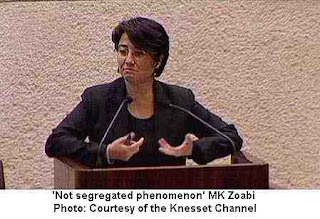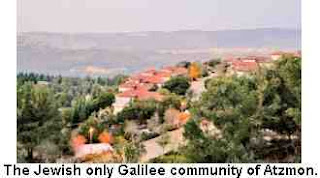

This is why Israel is, quite rightly, described as an Apartheid State. But one with a difference. You won’t see ‘Jews Only’ signs anywhere in Israel. You don’t need to. The Police and Army know what’s what in the West Bank and in Israel itself, the Knesset, Israel’s Parliament, has decided to simply by-pass the High Courts decision in the case of Ka’adan and the town of Katzir and more lately Rakefet, where it was decided that the Israeli Lands Authority couldn’t refuse to let flats to non-Jews.
Now the classical form of racism has been adopted, as per Jim Crow in the days of segregation in the USA. Existing residents will be able to decide who can and who can’t be admitted. And who will those existing residents be? Well of course Jews only, since before the High Court rulings the ILA did openly discriminate, alongside its partner the Jewish National Fund.
In Europe the law has moved on to outlaw what is called indirect discrimination i.e. where an ostensibly neutral provision, criterion or practice has a disparate impact on one particular group by virtue or race, sex, sexuality etc. In Israel indirect discrimination is the main form of discrimination. There are very few laws, apart from the Law of Return, which openly discriminate. Instead discrimination is done via adminstrative methods and the use of non-government agencies like the JNF.
We should congratulate Benjamin Netanyahu and Avigdor Liebermann on the openness of the discrimination. That is why Netanyahu only condemned the Chief Rabbi of Safed for saying non-Jews shouldn’t rent from Jews because of the pressure he was under. In practice his government does exactly the same, but more quietly.
Tony Greenstein
Published 02:43 29.10.10
By Amnon Be’eri-Sulitzeanu
Under the guise of the deceptively mundane name “Amendment to the Cooperative Associations Bill,” the Knesset’s Constitution, Law and Justice Committee this week finalized a bill intended to bypass previous rulings of the High Court of Justice. If indeed this legislation is approved by the Knesset plenum, it will not be possible to describe it as anything other than an apartheid law.
Ten years ago, the High Court of Justice ordered the town of Katzir to accept the family of Adel and Iman Kaadan, Arab citizens of Israel, as members of the community. Seven years later, the court issued a similar ruling against the Galilee village of Rakefet, which, like Katzir, is Jewish. Now, however, the legislature has come up with a proper “Zionist” response to the justices: If it becomes law, the amendment will give acceptance committees of communal villages the authority to limit residence in their towns exclusively to Jews.
Using polished and sanitized language, the bill would allow such committees in small rural suburbs to reject applications from families that “are incompatible with the social-cultural fabric of the community, and where there are grounds to assume that they will disrupt this fabric.”
In other words, if admissions committees were previously forced to exercise some degree of creativity if they wanted to hide their national-ethnic grounds for rejecting Arabs, now, as Rabbi Akiva said, “All is foreseen, and freedom of choice is granted” (Pirkei Avot 3 ). Arabs? Not here. Sorry, the law is with us on this.
Those who feign innocence, including some from the center of our political map, will say, “The bill is not intended to keep out Arabs. What’s wrong with supporting the right of communities to protect their unique way of life?”
Indeed, what is wrong with that? There’s no argument that the vegetarians of Moshav Amirim, in the Galilee, have a right to defend themselves against an invasion of carnivores, just as the practitioners of transcendental meditation at Hararit, in the Misgav region, need to be able to meditate without interruption, but those communities are genuinely unique in character. This is not the case for the dozens of yeshuvim kehilati’im (literally, “community settlements” ) all over Israel, whose principal cultural feature is the fact that their residents are Jewish and Zionist – hardly a population under imminent threat, whose unique way of life needs protection.
Several months ago, we were given a glimpse of just how quickly the new law will be implemented, when several such villages, anticipating the Knesset’s action, hurriedly established bylaws that effectively barred Arabs. In the communities of Yuvalim and Manof, in the Misgav area, applicants are now required to declare their allegiance to the Zionist vision, while in Mitzpe Aviv, a bit to the south, applicants must declare their identification with the values of Zionism and the definition of Israel as a Jewish and democratic state.
It’s not as if Arab families are standing in line to move to these gated communities, which were established mainly in the 1970s and ’80s by Zionist organizations like the Jewish Agency and the Jewish National Fund for the purpose of “Judaizing” areas like the Negev and the Galilee. No one ever expected these towns to provide the answer to the horrendous housing shortage faced by Israel’s Arab population. For them, not a single new town has been established since 1948, with the exception of a few impoverished Bedouin settlements in the Negev. Nor has the central government seen fit to assist or give approval to the existing Arab municipalities in the drawing up of master plans that would allow them to implement a program of growth and development to meet the needs of a growing population or mitigate their poor quality of life.
And this is without even mentioning cities like Upper Nazareth, Safed or Carmiel, where a variety of statements have been made – sometimes by the most senior municipal officials themselves – that are designed to push Arabs out or prevent their integration into these cities.
Segregation of Jews and Arabs in Israel of 2010 is almost absolute. For those of us who live here, it is something we take for granted. But visitors from abroad cannot believe their eyes: segregated education, segregated businesses, separate entertainment venues, different languages, separate political parties … and of course, segregated housing. In many senses, this is the way members of both groups want things to be, but such separation only contributes to the growing mutual alienation of Jews and Arabs.
Several courageous attempts – particularly in mixed cities and regions – have been made to change the situation, bridge the rifts and promote integration. These range from efforts to develop mixed educational frameworks, to joint economic ventures and other interventions intended to foster good neighborly relations based on equal opportunity. Until now, these attempts addressed a situation of de facto segregation. From today, however, segregation will be de jure, to the shame of Israel.
Amnon Be’eri Sulitzeanu is the co-executive director of the Abraham Fund Initiatives, an organization that promotes coexistence and equality between Israel’s Jewish and Arab citizens.